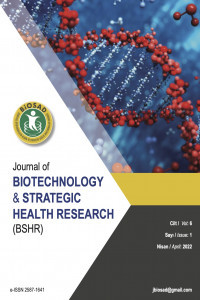KRONİK OBSTRÜKTİF AKCİĞER HASTALIĞI TANISI ile TAKİP EDİLEN HASTADA NADİR BİR BAKTERİYEL PNÖMONİ ETKENİ; GEMELLA HAEMOLYSANS
Bu raporda; KOAH tanısı ile takip edilen bir hastanın trakeal aspirat kültüründen saf olarak üretilen nadir karşılaşılan bir etken olan Gemella haemolysans’ın neden olduğu pnömoni tablosu sunulmuştur. Olgumuz; 5 yıldan beri KOAH tanısıyla takip edilen 67 yaşında erkek hasta olup, artan öksürük ve yükselen ateş şikayeti ile göğüs hastalıkları polikliniğine başvurmuştur. Muayenesinde dinlemekle solunum seslerinde kabalaşma, ekspiryumda uzama, sağ akciğer üst bölümde ralleri olduğu saptanmıştır. Laboratuvar testlerinde; eritrosit sedimentasyon hızı: 98 mm/h ve tam kan sayımı: Lökosit: 9980/ml iken, akciğer grafisinde sağ akciğer üst zonda opasite olduğu görülmüştür. Trakeal aspirat örneğinin gram boyamasında; yoğun (her alanda 25 den fazla) polimorf nüveli lökositler ve gram pozitif koklar görülmüştür. Trakeal aspirat örneğinin kültüründe koyun kanlı agar besiyerinde alfa-hemoliz oluşturan, büyük ve mat S tipi saf koloniler üremiştir. Kütle spektrometresi yöntemi ile bu bakteri Gemella haemolysans olarak tanımlanmıştır. Antibiyotik duyarlılık testi sonucuna göre bu bakteri; levofloksasin ve erithromisine karşı dirençli iken benzilpenisilin, ampisilin, sefotaksim, tetrasiklin, gemifloksasin, klindamisin ve seftriaksona karşı duyarlı bulunmuştur. Hastaya 7 gün süreyle 1X1 320mg gemifloksasin tedavisi uygulanmış ve bu tedavi sonrasında hastanın kliniğinde düzelme sağlanmıştır. Sonuç olarak; G. haemolysans, diğer nadir karşılaşılan enfeksiyon etkenlerinde olduğu gibi yoğun bakımda hastalar başta olmak üzere altta yatan bir hastalık ve immünyetmezlik olan hastalarda fırsatçı patojen olabileceği akılda tutulmalıdır. Ayrıca bu bakterinin bazı antibiyotiklere dirençli olduğu bilindiğinden mutlaka antibiyotik duyarlılık testlerine göre tedavi yönlendirilmelidir.
Anahtar Kelimeler:
Gemella haemolysans, pnömoni, KOAH, fırsatçı patojen
A Rare Bacterial Pneumonia in a Patient Followed by Diagnosis of Chronic Obstructive Pulmonary Disease; Gemella haemolysans
In this report, pneumonia table which is caused by Gemella haemolysans, a rare occurrence, purely produced from a tracheal aspirate culture of a patient followed by COPD diagnosis is presented.Our case; A 67-year-old male patient, who has been diagnosed COPD for 5 years, admitted to the chest diseases clinic with complaints of increased cough and rising fever. It was determined that the breathing sounds were roughening, extension in the expiration, and rallies in the upper part of the right lung in his examination. In laboratory tests; erythrocyte sedimentation rate: 98 mm / h, and complete blood count: leucocyte: 9980 / ml, whereas opacity was found at right lung upper zone in his chest radiography. In gram staining of tracheal aspirate sample; polymorphic core leukocytes and gram positive cocci were seen intensely (higher than 25 in each area). In the culture of the tracheal aspirate sample, large, matt and S-type pure colonies producing alpha-hemolysis in been sheep blood agar medium grew. By the mass spectrometry method, this bacterium has identified as Gemella haemolysans. According to the results of the antibiotic susceptibility test, this bacteria was found to be sensitive to benzilpenicillin, ampicillin, cefotaxime, tetracycline, gemifloxacin, clindamycin and ceftriaxone while resistant to levofloxacin and erythromycin. The patient was treated with 1x1 320 mg gemifloxacin for 7 days and the patient's clinic was improved after this treatment. As a result; It should be kept in mind that Gemella haemolysans may be an opportunistic pathogen in patients with an underlying disease and immunodeficiency, especially in patients with intensive care as well as other rare infectious agents. And what is more, since this bacterium is known to be resistant to some antibiotics, treatment should definitely be directed based on the antibiotic susceptibility tests.
Keywords:
Gemella haemolysans, Pneumonia, COPD, Opportunistic pathogen,
___
- KAYNAKLAR1. Thjotta T, Boe J. Neisseria haemolysans. A hemolytic species of Neisseria trevisan. Acta Pathol Mirobiol Scand 1938; Suppl. 37: 527-31.2. Reyn A, Birch-Andersen A, Berger U. Fine structure and taxonomic position of Neisseria haemolysans (Thjotta and Boe 1938) or Gemella haemolysans (Berger 1960). Acta Pathol Microbiol Scand Microbiol Immunol 1970; 78: 37589.3. Winn W, Allen S, Janda W, et al. Koneman’s Color Atlas and Textbook of Diagnostic Microbiology. 6th ed. Baltimore, MD Lippincott Williams & Wilkins, 2006: 674-7644. Woo PC, Lau SK, Fung AM, Chiu SK, Yung RW, Yuen KY. Gemella bacteraemia characterised by 16S ribozomal RNA gene sequencing. J Clin Pathol 2003; 56(9): 690–693. 5. Turan H, Özdemir Ö, Kurt-Azap Ö, Arslan H. Gemella haemolysans’ ın Etken Olduğu Bir Spondilodiskit ve Paraspinal Apse Olgusu. Klimik Dergisi 2010; 23(3), 138-40.6. Martha B, Duong M, Buisson M et al. Acute Gemella haemolysans spondylodiscitis in an immunocompetent patient. Presse Med 2003; 32(27): 1273-5.7. Lee MR, Lee SO, Kim SY, Yang SM, Seo YH, Cho YK. Brain abscess due to Gemella haemolysans. J Clin Microbiol 2004; 42(5): 2338-40.8. Raman SV, Evans N, Freegard TJ, Cunnigham R. Gemella haemolysans acute postoperative endophtalmitis. Br J Ophthalmol 2003; 87(9): 1192-3.9. Serarslan G, Çetin M. Cutaneous leishmaniasis secondarily infected by Gemella haemolysans. Ankem Derg 2008; 22(1): 37-8.10. Khan R, Urban C, Rubin D, Segal-Maurer S. Subacute endocarditis caused by Gemella haemolysans and a review of the literature. Scand J Infect Dis. 2004; 36(11-12): 885-8.11. Kaya E, Sayan M, Tokur M, Aral M. "Gemella haemolysans’ın Etken Olduğu Bir Ampiyem Olgusu." Türk Mikrobiyol Cem Derg 2017; 47(2): 94-96. 12. Eisenhut M, Jones C, Hughes D, Herrington S, Kokai G. Acute renal failure associated with Gemella haemolysans pneumonia. Pediatric Nephrology 2004; 19(4): 448-450.13. Köksal İ, Özlü T, Saral OB, et al. The etiological agents in adult patients with community acquired lower respiratory tract infections in Turkey. 17th ECCMID, 31 March-3April 2007, Munich/Germany.14. Clinical and Laboratory Standards Institute. Methods for Dilution Antimicrobial Susceptibility Tests for Bacteria That Grow Aerobically. Approved Standard. M7-A7. Wayne, PA: CLSI, 2017.15. Salceanu SO, Levy S, Cunningham R, Frimpong-Ansah K. Severe Gemella haemolysans endophthalmitis following ranibizumab intravitreal injection. Indian Journal of Ophthalmology 2017; 65(11): 1249-1251.16. Reed C, Efstratiou A, Morrison D, Woodford N. Glycopeptide-resistant Gemella haemolysans from blood. Lancet 1993; 342: 927-928.
- Yayın Aralığı: Yılda 3 Sayı
- Başlangıç: 2017
- Yayıncı: Deneysel, Biyoteknolojik, Klinik ve Stratejik Sağlık Araştırmaları Derneği
